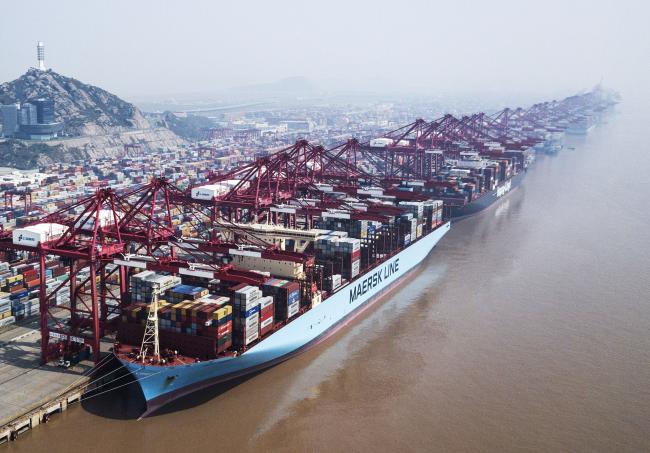(Bloomberg) -- The U.S. and China signaled they were open to resuming negotiations over trade after days of exchanging retaliatory threats, though Treasury Secretary Steven Mnuchin said Beijing must commit to deeper economic reforms.
High-level discussions over trade between the world’s two largest economies have stalled since June after a month of talks led by Mnuchin and Commerce Secretary Wilbur Ross with Chinese Vice Premier Liu He. Mnuchin told the House Financial Services Committee on Thursday that he and administration officials are “available” for negotiations, as he called U.S. tariffs imposed on China a “modest” step aimed at leveling the playing the field.
“To the extent to that China wants to make structural changes, I and the administration are available,” Mnuchin said on Thursday. “We are not advocating tariffs. We are advocating fair trade.”
Trump upped the stakes on Tuesday by moving forward with plans to impose further tariffs on $200 billion of Chinese imports, which could take effect as early as next month. China hasn’t yet outlined exactly how it will respond. Last week, the administration took its first direct tariff hit against China, slapping duties on $34 billion of Chinese imports with another $16 billion to soon follow, sparking tit-for-tat retaliation from China on U.S. goods.
China made its best efforts to avoid escalation of economic frictions with the U.S. and it’s Washington’s responsibility now that the matter has reached this point, according to a statement from the Commerce Ministry late Thursday in Beijing, adding that it’s been sincere in pushing to settle differences through dialog and consultation.
China’s Vice Minister of Commerce Wang Shouwen said in an interview on Tuesday in Geneva that China and the U.S. “should sit down and try to find a solution to this trade problem.”
During negotiations earlier this year to head off a trade war, China pledged to encourage its companies to import more U.S. goods, after the Trump administration pressed China to take steps to cut the American trade deficit by $200 billion. But in recent weeks, the administration have pushed for deeper changes to China’s economic system. That approach may drag out the trade conflict, given that Beijing has promised to gradually shift toward an economy that relies less on exports and state-driven investment.
The Trump administration is closely monitoring the domestic economic effect of tariffs, including on uncertainty for businesses, and it hasn’t yet found “any negative impact,” said Mnuchin. On the broader U.S. economic outlook, the Treasury secretary said he doesn’t consider the flatter yield curve -- which lately is showing a narrowing in the spread between short- and long-term government debt yields -- as indicative of an impending recession.
Mnuchin dismissed the idea that the U.S. and China are locked in a trade war, and instead described it as a dispute, and said said he’s not concerned that China will bring its holdings of U.S. Treasuries into the fight. “Exports create enormous job opportunities,” he said. “We should be doing things to make sure that our companies can compete fairly.”
Tariff Blowback
A Federal Reserve Bank of St. Louis economist warned on Thursday that Trump’s tariffs on Chinese goods may backfire, causing job cuts and plant shutdowns.
Higher tariffs have affected mostly intermediate goods from China -- supplies used by U.S. manufacturers in producing final products -- so they have the effect of raising costs and resulting in higher prices, economist Fernando Leibovici wrote in a blog post on the bank’s website. That will damage U.S. manufacturers’ international competitiveness, he said.
House Republicans including Jeb Hensarling of Texas and Andy Barr of Kentucky grilled Mnuchin on the negative impact of raising trade barriers at Thursday’s hearing. Their concerns are an indication that China’s and Europe’s retaliatory tariffs against U.S. exports would hit hardest in states that helped propel Trump to the presidency, bringing home the risks of a trade war ahead of November’s midterms. The EU, along with Canada and Mexico, have retaliated against separate tariffs on imported steel and aluminum imposed by Trump.
Of the 10 states that face potential Chinese tariffs on more than $1 billion of their exports, seven backed Trump in 2016, according to a report by the American Action Forum, a Washington-based group that opposes protectionist trade policies.
At Thursday’s hearing, Republican Representative Ann Wagner said constituents in her soybean-producing state of Missouri are feeling the “present-day" impact of the trade war. Soybean futures have been spiraling lower since late May, just as the trade dispute was gearing up. Mnuchin assured Wagner that he’s following soybean prices daily, calling China’s targeting of the commodity “unfair.”
House Speaker Paul Ryan on Thursday drew a stark difference between his vision for trade and Trump’s, rejecting tariffs and warning that pulling out of trade agreements is a threat to the U.S. economy. “We risk having American products locked out of new markets, jobs moved overseas, and a decline in American influence,” Ryan said at the Economic Club of Washington.
On Thursday, Mnuchin also repeated the administration’s support for bipartisan legislation to tighten scrutiny over foreign investments in the U.S. and attach it to a must-pass defense spending bill.
Trump last month endorsed expanding the powers of the Committee on Foreign Investment in the United States, or Cfius, for reviewing investments from abroad over national security concerns. He turned to Cfius over an earlier plan to invoke emergency powers to impose sweeping new restrictions on Chinese investments.
Trump has been moving forward with tariffs against China and considering investment restrictions since his administration concluded in March that Beijing violates U.S. intellectual-property rights, such as by forcing American firms to hand over technology.
